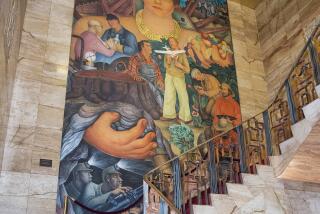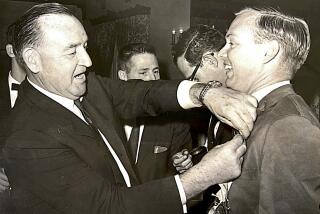A Native Daughter Puts Ax to Myth
- Share via
SACRAMENTO -- California recalled its governor. Native-born novelist and essayist Joan Didion has recalled California.
Her just-published “Where I Was From” presents us with a startling, provocative and depressing indictment of California by one of the most noted writers the state has produced. Whether or not one agrees with its conclusions, “Where I Was From” -- as lament, as jeremiad -- constitutes a historical document. Never before has a Californian offered a bleaker assessment of life and moral value in the Golden State.
The myth of California, Didion contends, is based on a self-deception so intense that it edges into willful falsehood. The overland pioneers of the 1840s, she asserts, did not behave as well on the trail as they claimed to have done. They rushed, rather, pell-mell across the continent, leaving behind to die those too weak to keep up. Once in California, they experienced rates of insanity far beyond the national average; indeed, insane asylums were among the earliest of public institutions established in the new state, and the rates of commitment, often for trivial purposes, remained the highest in the nation well into the 20th century.
In the 1860s, she continues, the Big Four -- Leland Stanford, Collis P. Huntington, Mark Hopkins and Charles Crocker -- leveraged untold federal dollars and land grants to create the trans-Sierran portions of the transcontinental railroad. By the 1880s, the Southern Pacific Railroad and a dozen or so corporate-style landowners owned a significant portion of California. “As a class,” W.F. Swasey wrote in 1891 about the American founders of California, “they were a chivalrous, brave, generous and unselfish set of men.... They found California an uncultivated, almost unpopulated, paradise, blooming in silence and solitude, amid primeval and magnificent luxuriance, like a young maiden waiting for her bridegroom.”
The habit of leveraging federal dollars while praising pioneer virtues and deriding taxes and government continued through the decades. In the late 19th and early 20th centuries, Californians, still proclaiming their habits of frontier independence, parlayed hundreds of millions of federal dollars to create an irrigation-based economy that relied on a continuing dole of federally sponsored water. Subsidized water, in turn, ballooned agribusiness through products -- cotton and rice especially -- that depended entirely upon irrigation paid for by other people. In the 20th century, empowered by federally subsidized water and hydroelectricity from Hoover Dam, California -- Southern California especially -- became a garrison state dependent upon the fiscal steroids of World War II and Cold War spending.
Today, Didion concludes, California is an economic colony owned by non-Californians: an assertion she visualizes in the corporate jets flying into the Santa Rosa-area airport for the annual encampment at the Bohemian Grove.
It was all a sham, Didion laments. Pioneers proclaiming community but leaving their weak behind on the trail; railroad men imagining that it was they who had financed the enterprise; agri-capitalists pretending to be farmers while keeping the land of California devoid of human settlement; defense workers in Lakewood, believing that they had good jobs for life, then descending, they and their children, into self-pity and misbehavior when the Cold War economy ended.
Didion is equally tough on her family and her Goldwater Republican youthful self. Raised in a suburban Sacramento family that had come west by covered wagon in the 1840s, Didion absorbed a myth and, by implication, a sustaining narrative for her life, solidly based in Anglo-American (Episcopalian) values centered in an equally comforting California story. Following in the steps of previous generations, she attended UC Berkeley in the early to mid-1950s, later describing the campus as California’s best idea of itself. Then it was on to New York to work for Vogue and, growing homesick, the composition in New York of her first novel, “Run River” (1963). It is the story, significantly, of how growth and development in metro Sacramento were weakening the values and connections to the land of local families descended from pioneer stock.
In “Where I Was From,” Didion is as merciless in deconstructing her family’s history and the validity of her first novel as she is in indicting California society, past and present. At age 69, it seems increasingly clear to her the myths surrounding her pioneer stock, her pride in California (as evidenced early, in an eighth-grade address) and, above all, the yearning homesickness, the sense of personal identity and moral saga that pulsate through “Run River,” are irrelevant to who she is today, a writer living in Manhattan. Pointedly, she ends her personal story with a flight back to New York after her mother’s funeral.
Rarely does any one individual have the chutzpah, reinforced by a compellingly tensile prose style, to indict, in one headlong jeremiad, family, history, place, personal identity. Didion’s bleak vision makes Mike Davis seem a booster.
In her book, Didion has frequent recourse to observations by Josiah Royce, the Harvard-based philosopher born in Grass Valley, Calif., and raised there and in San Francisco. In his writings on California, Royce, like Didion a graduate of UC Berkeley, struggled with many of the same questions Didion addresses: the destruction of nature in the Gold Rush, the racism of that era and after, antisocial behavior and vigilantism in the mines, the obsession of getting rich, making it big, getting by with minimal effort. Royce contends, however, that although Americans in California’s frontier days egregiously misbehaved, a non-misbehaving majority came into possession of the state quite soon.
In Didion’s view, there are no redemptive possibilities in California, no room, as Royce would put it (and, trained in Germany, Royce liked capital letters) for the Hope of the Great Community and the Higher Provincialism.
Where does that leave the rest of us, the 35 million Californians whom Didion has left behind? Instructed, for one thing, by aspects of her analysis, especially in the matter of disguised federal subsidies. Sad, for another, at having lost even the partial assent of a distinguished native daughter. Angry, perhaps, that one person, however respected as a writer, should repudiate, or so it seems, the entire California experiment. Concerned, finally, that Didion’s erasure of her past (how very Californian) should detach her in some debilitating way, even in expatriation, from the place (even as a place to trash) and the forces that helped nurture her sensibility and talent.
Many Anglo-American Californians share Didion’s disappointment with the current problems afflicting their state. Despite her repudiation of her youthful attitudes, the Goldwater Republican in her still lingers in “Where I Was From”: an abiding disappointment, that is, with how things have turned out and a longing for a better past, whether imaginary or imagined in retrospect. At some future time, historians might find this book a key text in a larger Anglo-American surrender of dominance and belief in the Golden State. For the minorities -- many of whom are immigrants -- who now constitute the majority of California’s population, however, Didion’s concerns seem beside the point as they go about the business of building their lives and, alongside the rest of us, struggling to make California work. From the immigrant perspective especially, noir -- even well-written noir -- is an Anglo hang-up. After all, as Royce pointed out, California must be earned through vision, hope and corrective action. Let’s get on with it.
More to Read
Sign up for Essential California
The most important California stories and recommendations in your inbox every morning.
You may occasionally receive promotional content from the Los Angeles Times.













